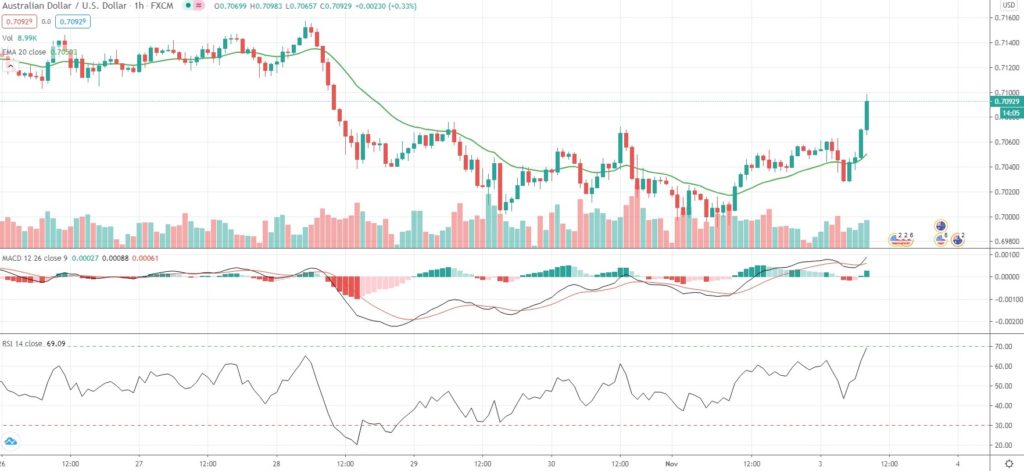AUD/USD rebounded from earlier lows, hit right after the Reserve Bank of Australia’s decision to ease policy, but moves were limited due to caution ahead of US Election Day.
Market players have remained focused on the US election result later Tuesday, with many investors relying on the safety of the US Dollar so that they are in a proper position to take advantage of market volatility when the outcome becomes known.
Against a basket of six major peers, the US Dollar was trading not far from Monday’s one-month high on Tuesday.
Polls have shown Democrat Joe Biden being ahead of President Donald Trump. Analysts have expressed the opinion that a win by Biden could lead to USD depreciation, since he will probably press on with a huge fiscal stimulus package and take a freer approach to trade.
On the other hand, a surprise victory by Donald Trump could bring back fears of tariffs, according to Mizuho chief Asia foreign exchange strategist Ken Cheung.
The Aussie Dollar retreated to an intraday low of 0.7028 against its US counterpart and Australian bond yields plummeted to historic lows on Tuesday, after the Reserve Bank of Australia cut its official cash rate and the target for 3-year bond yields by 15 basis points to 0.10% at its policy meeting. The move was largely anticipated by markets.
The central bank also extended its bond buying program, while saying it will purchase AUD 100 billion in Federal and State debt with maturities of around 5 to 10 years over the upcoming six months.
The RBA Board said that they expected positive GDP growth during the third quarter, regardless of COVID-19-related restrictive measures in the state of Victoria. The nation’s GDP is now expected to increase by 6% during the year to June 2021 and by 4% in 2022. At the same time, Australia’s rate of unemployment is now expected to peak just below 8%, compared with a previous projection of 10%.
“The RBA didn’t disappoint when it cut interest rates and launched quantitative easing today,” Marcel Thieliant, a senior economist at Capital Economics, said.
Yet, “even though the RBA today became more optimistic about the outlook for the economy, we think there’s a good chance that QE will be extended further next year.”
As of 8:42 GMT on Tuesday AUD/USD was gaining 0.53% to trade at 0.7090, while extending a rebound from Monday’s low of 0.6991, or a level not seen since July 20th (0.6973). The major pair has risen 0.91% so far in November, after retreating 1.87% in October.
In terms of US macroeconomic data, today market players will be paying attention to the monthly report on factory orders for September, due out at 15:00 GMT.
Bond Yield Spread
The spread between 2-year Australian and 2-year US bond yields, which reflects the flow of funds in a short term, equaled -5.6 basis points (-0.056%) as of 7:15 GMT on Tuesday, down from -4.3 basis points on November 2nd.
Daily Pivot Levels (traditional method of calculation)
Central Pivot – 0.7034
R1 – 0.7077
R2 – 0.7101
R3 – 0.7143
R4 – 0.7186
S1 – 0.7010
S2 – 0.6968
S3 – 0.6944
S4 – 0.6920






